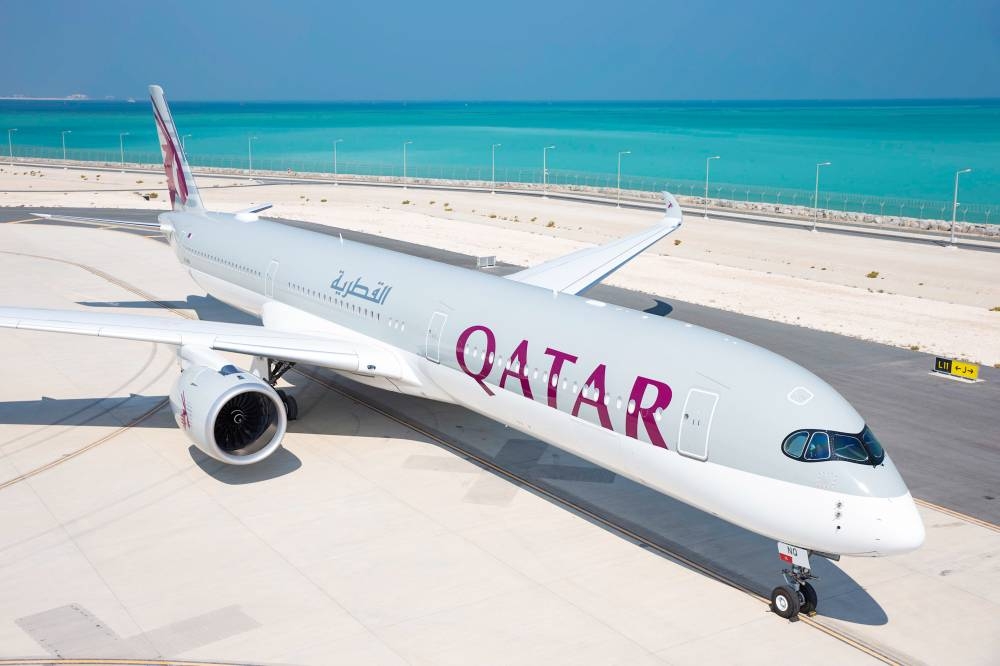Qatar Airways has signed a deal with Shell to source 3,000 metric tonnes of neat Sustainable Aviation Fuel (SAF) at Amsterdam Schiphol airport. It encompasses the existing jet fuel contract with Shell at Amsterdam which will now see Qatar Airways using at least a 5% SAF blend over the contract period for the fiscal year 2023-2024. The Qatar Airways bilateral agreement with Shell is part of a wider effort initiated by the oneworld alliance, which has set target of using Sustainable Aviation Fuel (SAF) for 10% of combined fuel volumes by 2030.
Qatar Airways is the first carrier in the Middle East and Africa to procure a large SAF amount in Europe beyond government SAF mandates. SAF offers significant potential for decarbonisation as neat SAF can reduce full lifecycle emissions by up to 80% compared to conventional jet fuel. This means that Qatar Airways will be reducing its emissions on flights from Amsterdam by approximately 7,500 tonnes of CO2 for the fiscal year.
SAF is considered the most important way to decarbonise airline operations in the next few decades, before alternatively powered aircraft can be widely deployed in commercial operations. This is why SAF developments deserve attention. Compared to conventional jet fuel, SAF can reduce up to 80% carbon emissions on a lifecycle basis, depending on the SAF technology used. Aircraft today are powered by liquid aviation fuel, made mostly from fossil fuel sources. Yet new fuels have been developed that have the potential to dramatically reduce aviation’s net CO2 emissions. Although supply is currently limited (0.01% of global jet fuel use), sustainable aviation fuels are already in use today and take-up is increasing.
Aviation currently accounts for approximately 2-3% of man-made global carbon emissions, but without action, aviation could consume up to 22% of the global carbon budget by 2050. To maintain growth and at the same time address its environmental impact, the wider aviation industry has committed to reducing net aviation carbon emissions to 50% below 2005 levels by 2050. But scaling up the use of SAFs to a global market continues to be a challenge as it requires substantial investment.
In the US today, sustainable aviation fuel is approximately $6.83 a gallon, while jet fuel stands at $2.34 — this is why many airlines, including the profitable ones, are so reluctant to pay for SAF at these prices.
The International Air Transport Association, a trade group including the world’s biggest airlines, set a target in 2021 to achieve net-zero emissions by 2050. SAF would account for 65% of the abatement, IATA thinks.
But the move would be costly, said Willie Walsh, the former chief executive of British Airways, who runs IATA. “It is achievable,” he told a Financial Times conference last week. But “anyone who says the costs of transitioning to net zero are going to be low or unnoticeable I’m afraid is fooling themselves”.
“Passengers will have to pay higher fares. We need to be honest with our customers”, Walsh said. “Airlines are not in a financial position to absorb that cost, so ultimately it will have to be passed on to consumers.”
The industry has called on governments to assist potential SAF suppliers to develop the necessary feedstock and refining systems – at least until the fledgling industry has achieved the necessary critical mass and prices drop thanks to economies of scale.
Qatar Airways Group Chief Executive, HE Akbar al-Baker, said: “At Qatar Airways, we are strongly committed to supporting the industry’s effort to ramp-up the use of sustainable aviation fuel, as one of the key pillars to decarbonise the aviation industry. Last year, we signed our first offtake agreement in the US, and now we are placing a multi-million US dollar SAF deal in Amsterdam to illustrate our SAF commitment and reiterate our calls for a more robust SAF supply chain across our global network”.
“We remain steadfast in our ambitious target of 10% SAF use by 2030 and this announcement, establishes another landmark for Qatar Airways that underlines the positive outcome of the industry’s collaboration which is critical to accelerating the SAF supply and achieving our target. SAF is still 3 to 5 times more expensive than fossil-based jet fuel. This is why it is essential for all stakeholders to play their part in facilitating research and development of SAF facilities, enhancing economies of scale, providing financing and placing supportive policies”.
“Qatar Airways and Shell have a history of collaboration, so it is fantastic to now work together on decarbonisation as we supply them with SAF for the first time,” said Jan Toschka, president of Shell Aviation. “SAF is a key lever for decarbonising aviation, but scaling its supply and use requires concerted action from across the aviation sector. Today’s agreement is a great example of the collaborative actions that are required to help accelerate aviation’s progress towards net zero.”
More than 99% of airline emissions and approximately 50% of airport emissions are related to the combustion of jet fuel. Although increased energy efficiency and reduction in energy demand are effective ways to reduce fuel consumption and related greenhouse gas emissions, these improvements do not offer a sole solution to aviation-related emissions.
The aviation industry has a clear vision for its use of SAFs and will adopt only fuels made from feedstocks that can be grown or produced without the risk of unintended environmental and social consequences, such as competition with food production or deforestation.
More than 45 airlines now have experience with SAF, and around 14bn litres of SAF are in forward purchase agreements.
Passengers of Qatar Airways are able today to compensate for their flight emissions through the purchase of high-quality carbon credits, credited under International Civil Aviation Organisation criteria, the UN's aviation body. Qatar Airways currently invests in carbon credit projects that generate renewable energy, which help in reducing carbon emissions. Qatar Airways is also working on introducing a solution which will allow passengers and customers to offset their emissions by contributing to the cost of SAF.
Elsewhere, the Biden administration, which has set industry a “grand challenge” to produce 3bn gallons a year of SAF by 2030 from less than 16mn now, says feedstock will come from agricultural waste produced alongside corn and soyabeans, and woody biomass in western states.
But until long-term demand for the fuel is guaranteed, investors will be reluctant to plough capital into new SAF production capacity, leaving costs for a niche product high.
The author is an aviation analyst. Twitter handle: @AlexInAir


